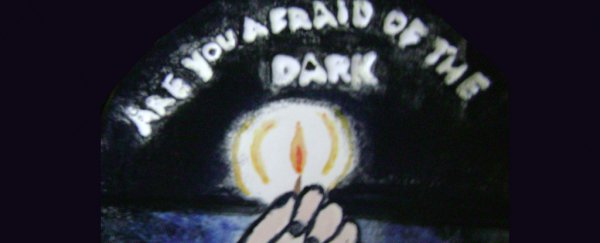As children, we all seem to go through a 'scared of the dark' phase. Back when we were younger and, in a lot of ways, fearless in the face of things we're more cautious about as adults, there was something about darkness that put us on edge every night. After all, that's when the monsters come out to play (or so we imagined).
Even though that sounds like a childish thing to believe, our fear of the dark is an evolutionary trait that we picked up to survive real-life predators stalking the night. Researchers have hypothesised that this innate fear stems from a point of human history when we were nowhere near the top predators we are today. Humans only really became super predators with the advent of technology, which wasn't that long ago.
Before tech, our ancestors were constantly on the look-out for predators that wanted nothing more than to chow down on human sandwiches. To make that even scarier, most of these predators hunted at night - a time of day when we are especially vulnerable to attack because of our relatively poor eyesight.
This means that it was super important for our ancestors to stay safe in the middle of the night. If they didn't, they'd die. Over the years, this nightly fear became instinctual, and we still experience it today as a form of mild anxiety.
According to Andrew Tarantola at Gizmodo, a 2012 study by researchers from the University of Toronto in Canada claimed that this anxiety isn't a full-blown panic reaction. Instead, it's kind of like a lingering, foreboding fear that keeps us on edge, which is exactly what our ancestors needed. This type of anxiety is your body's way of keeping you on your toes in case you need to 'fight or flight' yourself away from danger.
Being afraid of the dark is, in essence, a fear of the unknown. We can't see what's out there and it freaks us out because our imagination fills in the worst possible thing. For ancient humans, it was lions and other predators, and in today's big, predator-free cities, it's monsters.
We create monsters because they fill that predator void. A great example of this is how horror movies work: good ones never directly show you the monster because your imagination makes something way scarier.
As early human civilisations slowly morphed into the city-loving societies we have today, our fear of the dark remained. Only it's a bit strange now because most of us don't need to fear the dark, especially when we have lightbulbs, phone screens, and TV sets that, for better or worse, make darkness a choice, rather than inevitability.
Though we don't technically need this fear, it's still there, and it's confusing. These traits are normally passed down by distant relatives over the centuries to the point of it getting implanted in our psyches. When you consider how long humans have been around, it wasn't until very recently that this fear became almost obsolete for those of us living in big cities.
So, if you or a child in your life is afraid of the dark, remember that at one time it was a vital survival trait that kept our collective ancestors alive. It doesn't make you a chicken, it just makes your body more attuned for threats and, therefore, more fit to survive.
